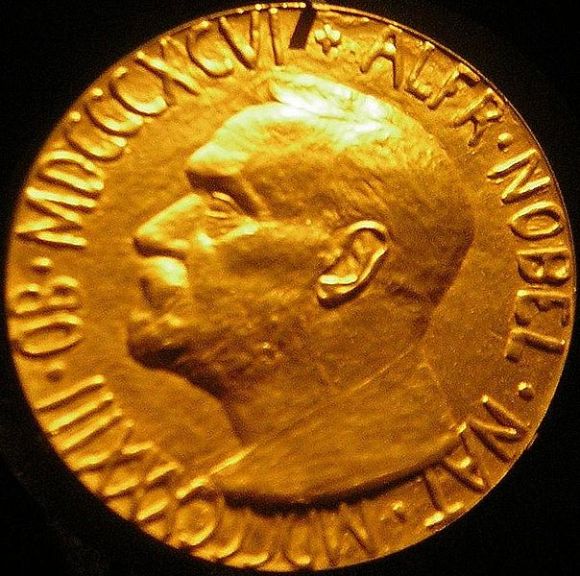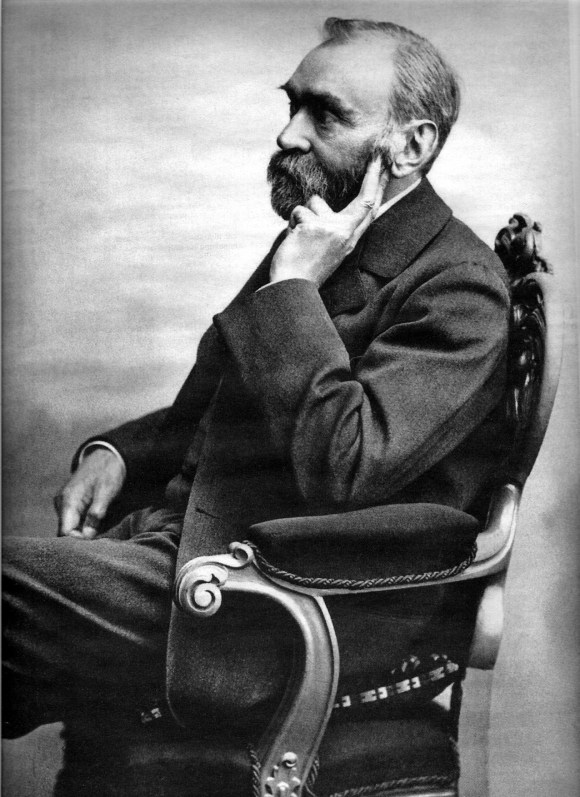
The 2014 Nobel Peace Prize has an unprecedented nomination: the Ninth Article of the Japanese constitution. The Ninth Article renounces the right to engage in war or to maintain a military. The group advocating the nomination, the “Constitution’s Ninth Article for the Nobel Peace Prize,” is based in Sagamihara, Kanagawa Prefecture.
Housewife Naomi Takusu (37) came up with the idea. She started an online petition last May and garnered 1,500 signatures in just five days. She contacted the Nobel Committee, from whose response she learned that candidates can only be nominated through certain channels and must be individuals or groups. She changed her strategy and tried again for 2014.
Nominations can come from people like government officials, university professors, directors of peace research institutes and laureates of the prize. The committee reached out to such people for help and secured 43 recommendations. They also received 24,887 signatures on the public letter of recommendation (though that has since risen to over 40,000). They decided that the official nominee would be the people of Japan.
Takusu is quoted as saying “It would be meaningful for the Japanese people, who have upheld the Ninth Article and refrained from engaging in war for almost 70 years.”
Though the article has remained in place since the end of the war, it has not been uncontested. Shinzo Abe has promised to modify the Ninth Article to allow for military expansion. While Japan technically does not have a military, it does maintain the Japan Self-Defense Forces.
▼ The Ninth Article remains a subject of debate. This small demonstration promoted maintaining the article in 2012.
Much of the Japanese constitution, including the Ninth Article, was written by an American committee after Japan’s surrender. It can be seen as a symbol of continuing American imperialism in Japan. Issues such as aggression from North Korea and crimes committed by American soldiers have been cited as reasons for Japan to end its reliance on the American military and develop its own armed forces.
Eri Okada (57) of the executive office commented, “I’m happy the application was accepted. The prize-winner must be a person or organization, so the committee submitted the Japanese people. That means that each and every citizen of Japan has become a nominee.”
Takusu said, “We have just managed to get a nomination because of the combined wishes for peace of many people. We are really grateful to all the people who have worked with us towards our goal.”
Due to the 50 year secrecy rule for Nobel Prizes, it is impossible to tell if the nomination has been accepted or not. The winner will be announced on October 10 and awarded two months later, on the anniversary of Alfred Nobel’s death.
▼ Alfred Nobel left his fortune to fund the annual prizes “to those who, during the preceding year, shall have conferred the greatest benefit to mankind.”
2014 has brought more nominations than ever for the Peace Prize; out of 278 nominations, 47 of which are organizations. Other nominees for 2014 include Malala Yousafzai, Pope Francis, Edward Snowden, Vladmir Putin and the International Space Station Partnership.
If the bid is successful, the people of Japan would join the ranks of laureates such as Aung San Suu Kyi, Nelson Mandela, the Red Cross, Martin Luther King Jr. and Liu Xiaobo.
Sources: The Huffington Post Japan, Nobel Prize, GlobalPost, PBS
Images: Wikipedia, Wikipedia



 Nobel Prize for Literature eludes Japan’s Haruki Murakami yet again, and he couldn’t care less
Nobel Prize for Literature eludes Japan’s Haruki Murakami yet again, and he couldn’t care less Zimbabwe President Robert Mugabe wins China’s Confucius Peace Prize
Zimbabwe President Robert Mugabe wins China’s Confucius Peace Prize Japanese news agency under fire for announcing Nobel Prize goes “to foreigners”
Japanese news agency under fire for announcing Nobel Prize goes “to foreigners” Haruki Murakami denied Nobel Prize in Literature AGAIN, so summer is officially over
Haruki Murakami denied Nobel Prize in Literature AGAIN, so summer is officially over Japanese team wins Ig Nobel prize for confirming that banana peels are in fact slippery
Japanese team wins Ig Nobel prize for confirming that banana peels are in fact slippery Chance to play Teris on a massive staircase in Kyoto Station coming in March
Chance to play Teris on a massive staircase in Kyoto Station coming in March Viral Japanese cheesecake from Osaka has a lesser known rival called Aunt Wanda
Viral Japanese cheesecake from Osaka has a lesser known rival called Aunt Wanda Ramen for 99 yen?!? Best value-for-money noodles found at unlikely chain in Japan
Ramen for 99 yen?!? Best value-for-money noodles found at unlikely chain in Japan Which convenience store onigiri rice balls are the most popular? Survey reveals surprising results
Which convenience store onigiri rice balls are the most popular? Survey reveals surprising results Foreign tourists in Japan will get free Shinkansen tickets to promote regional tourism
Foreign tourists in Japan will get free Shinkansen tickets to promote regional tourism Drift ice in Japan is a disappearing winter miracle you need to see now
Drift ice in Japan is a disappearing winter miracle you need to see now The best Hobonichi diaries, covers and stationery for 2026
The best Hobonichi diaries, covers and stationery for 2026 This gachapon capsule machine dispenses real Akoya pearls, with certificates of authenticity
This gachapon capsule machine dispenses real Akoya pearls, with certificates of authenticity Japanese schoolgirls’ hemlines are still up, but socklines are way down
Japanese schoolgirls’ hemlines are still up, but socklines are way down Five things that keep Japanese people chained to their jobs
Five things that keep Japanese people chained to their jobs Starbucks Japan releases first-ever Hinamatsuri Girls’ Day Frappuccino
Starbucks Japan releases first-ever Hinamatsuri Girls’ Day Frappuccino Japanese restaurant chain serves Dragon Ball donuts and Senzu Beans this spring
Japanese restaurant chain serves Dragon Ball donuts and Senzu Beans this spring Highest Starbucks in Japan set to open this spring in the Tokyo sky
Highest Starbucks in Japan set to open this spring in the Tokyo sky Japan Extreme Budget Travel! A trip from Tokyo to Izumo for just 30,000 yen [Part 1]
Japan Extreme Budget Travel! A trip from Tokyo to Izumo for just 30,000 yen [Part 1] Japan has only one airport named after a samurai, so let’s check out Kochi Ryoma【Photos】
Japan has only one airport named after a samurai, so let’s check out Kochi Ryoma【Photos】 Japan Extreme Budget Travel! A trip from Tokyo to Izumo for just 30,000 yen [Part 2]
Japan Extreme Budget Travel! A trip from Tokyo to Izumo for just 30,000 yen [Part 2] Japan’s craziest burger chain takes menchi katsu to new extreme levels
Japan’s craziest burger chain takes menchi katsu to new extreme levels Japanese drugstore sells onigiri at pre-stupid era prices, but how do they compare to 7-Eleven?
Japanese drugstore sells onigiri at pre-stupid era prices, but how do they compare to 7-Eleven? Yakuzen ramen restaurant in Tokyo is very different to a yakuza ramen restaurant
Yakuzen ramen restaurant in Tokyo is very different to a yakuza ramen restaurant Tokyo Skytree turns pink for the cherry blossom season
Tokyo Skytree turns pink for the cherry blossom season Japan’s newest Shinkansen has no seats…or passengers [Video]
Japan’s newest Shinkansen has no seats…or passengers [Video] Starbucks Japan releases new sakura goods and drinkware for cherry blossom season 2026
Starbucks Japan releases new sakura goods and drinkware for cherry blossom season 2026 Foreigners accounting for over 80 percent of off-course skiers needing rescue in Japan’s Hokkaido
Foreigners accounting for over 80 percent of off-course skiers needing rescue in Japan’s Hokkaido Super-salty pizza sends six kids to the hospital in Japan, linguistics blamed
Super-salty pizza sends six kids to the hospital in Japan, linguistics blamed Starbucks Japan unveils new sakura Frappuccino for cherry blossom season 2026
Starbucks Japan unveils new sakura Frappuccino for cherry blossom season 2026 The 10 most annoying things foreign tourists do on Japanese trains, according to locals
The 10 most annoying things foreign tourists do on Japanese trains, according to locals Take a trip to Japan’s Dododo Land, the most irritating place on Earth
Take a trip to Japan’s Dododo Land, the most irritating place on Earth Naruto and Converse team up for new line of shinobi sneakers[Photos]
Naruto and Converse team up for new line of shinobi sneakers[Photos] Is China’s don’t-go-to-Japan warning affecting the lines at a popular Tokyo gyukatsu restaurant?
Is China’s don’t-go-to-Japan warning affecting the lines at a popular Tokyo gyukatsu restaurant? Survey asks foreign tourists what bothered them in Japan, more than half gave same answer
Survey asks foreign tourists what bothered them in Japan, more than half gave same answer Japan’s human washing machines will go on sale to general public, demos to be held in Tokyo
Japan’s human washing machines will go on sale to general public, demos to be held in Tokyo Starbucks Japan releases new drinkware and goods for Valentine’s Day
Starbucks Japan releases new drinkware and goods for Valentine’s Day We deeply regret going into this tunnel on our walk in the mountains of Japan
We deeply regret going into this tunnel on our walk in the mountains of Japan Studio Ghibli releases Kodama forest spirits from Princess Mononoke to light up your home
Studio Ghibli releases Kodama forest spirits from Princess Mononoke to light up your home Major Japanese hotel chain says reservations via overseas booking sites may not be valid
Major Japanese hotel chain says reservations via overseas booking sites may not be valid Put sesame oil in your coffee? Japanese maker says it’s the best way to start your day【Taste test】
Put sesame oil in your coffee? Japanese maker says it’s the best way to start your day【Taste test】 No more using real katana for tourism activities, Japan’s National Police Agency says
No more using real katana for tourism activities, Japan’s National Police Agency says Japanese Cabinet to Reward Nobel Prize Winner with New Washing Machine
Japanese Cabinet to Reward Nobel Prize Winner with New Washing Machine Nobel Prize-winner Shuji Nakamura to Japan’s young people: “Get out of Japan”
Nobel Prize-winner Shuji Nakamura to Japan’s young people: “Get out of Japan” Japanese doctor wins Ig Nobel Prize for learning we can kind of breathe in through our butts
Japanese doctor wins Ig Nobel Prize for learning we can kind of breathe in through our butts Painting a cow like a zebra keeps away pests according to Ig-Nobel-winning Japanese research
Painting a cow like a zebra keeps away pests according to Ig-Nobel-winning Japanese research